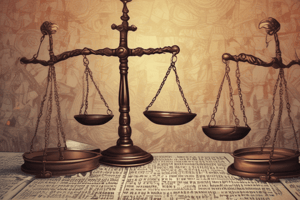Podcast
Questions and Answers
What distinguishes a human act from an act of a human?
What distinguishes a human act from an act of a human?
- Human acts are performed with knowledge and intention, while acts of a human are instinctive. (correct)
- Human acts are always ethical, whereas acts of a human are irrelevant to ethics.
- Acts of a human are always conscious choices, while human acts can be unconscious.
- Human acts lack any form of decision-making, while acts of a human involve rational thought.
What is meant by freedom in the context of moral acts?
What is meant by freedom in the context of moral acts?
- The ability to choose without any constraints or limitations.
- The lack of obligation to consider the impact of one's actions on others.
- The capacity to make choices that are aligned with moral principles. (correct)
- The authority to act in any manner, irrespective of consequences.
How does the concept of free will relate to moral decision-making?
How does the concept of free will relate to moral decision-making?
- Free will allows individuals to make choices that reflect their moral beliefs. (correct)
- Free will implies that all choices are equally moral.
- Free will restricts the ability to act out of impulse.
- Free will eliminates the possibility of moral dilemmas.
Which statement best reflects the importance of moral acts in society?
Which statement best reflects the importance of moral acts in society?
What role does knowledge play in distinguishing moral acts from mere actions?
What role does knowledge play in distinguishing moral acts from mere actions?
Flashcards are hidden until you start studying
Study Notes
Human Acts vs. Acts of a Human
- Human acts are deliberate and intentional actions, stemming from conscious choice and understanding.
- Acts of a human are actions performed without conscious awareness or control, like reflexes or involuntary bodily functions.
Freedom in Moral Acts
- Moral freedom refers to the ability to choose between good and evil, right and wrong.
- It involves the capacity to act according to one's own rational judgment and moral conscience.
Free Will and Moral Decision-Making
- Free will enables individuals to deliberate and ultimately choose the course of action they believe to be morally right or wrong.
- It's the foundation for holding individuals accountable for their moral choices.
Importance of Moral Acts in Society
- Moral acts contribute to the well-being of society by promoting justice, harmony, and respect.
- They foster trust and cooperation among individuals and communities.
Knowledge and Moral Acts
- Knowledge plays a crucial role in discerning moral acts from mere actions.
- Understanding the implications of one's choices and the moral principles at stake is essential to acting morally.
Studying That Suits You
Use AI to generate personalized quizzes and flashcards to suit your learning preferences.




